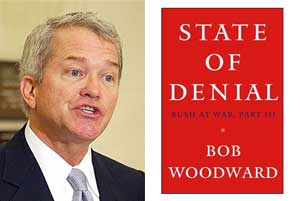
Isn’t it hypocritical to be Co-chairman of the Missing and Exploited Children Caucus in the U.S. House of Representatives whilst writing sexually explicit e-mails to an underage congressional page?
- He publicly crusaded against the very activities that he appears to have done himself. By definition, doesn’t that make him a hypocrite? And a corrupt one at that?
- This is very similar to what happened with evangelist Jimmy Swaggart who advocated moral and marital purity but was caught with a prostitute.
- There’s a psychological component in play here: contradictory actions such as these are consistent with those of a person struggling with an internal moral battle. “The righteous, fervent crusading against something often may represent an attempt to keep one’s own impulses under control,” said Dr. Jon Shaw , director of the division of child and adolescent psychiatry and behavioral sciences at the U of Miami(i).
 Despite the reports and warnings of the worsening situation in Iraq, Bush, Rumsfeld and other key figures insist "repeatedly in public" that "things are better(ii)."
Despite the reports and warnings of the worsening situation in Iraq, Bush, Rumsfeld and other key figures insist "repeatedly in public" that "things are better(ii)."- Amid the escalating violence in Nov. 2003, Woodward quotes Bush as saying "I don't want anyone in the cabinet to say it is an insurgency. I don't think we are there yet(iii)."
- And in May 2005, Woodward says Vice President Dick Cheney told CNN that the insurgency was in "the last throes" when Bush knew it was, in fact, worsening(iii).
- 'State of Denial' recounts disturbing anecdotes about administration pettiness on a level with high school(iii).
- Rumsfeld cut others out of Iraq decisions and planning and would not even return the phone calls of then-National Security adviser Condoleezza Rice until ordered to do so by Bush, the author claims(iii).
- Rumsfeld also "bleached out independent military advice and got too many generals and people in the upper reaches of the system who were not strong, who were not independent, who would not come and say, 'hey, look, this is the way I look at it.'(iii)"
- Rumsfeld rejected recommendations that it would take about 450,000 troops to secure Iraq and instead sent one-third that number(iii).
- The defense secretary also ignored a State Department blueprint that could have prevented the looting of arms depots by future insurgents, Woodward claims(iii).
- On Wednesday he claimed Democrats can't be trusted to protect the nation from terrorist attacks. "Vote Republican for the safety of the United States," he said(iii).
- Isn’t this very similar to VP Cheney’s 2004 comment that Sen. John Kerry would risk another terror attack?
- Bush also said his pro-growth economic policies have helped working Americans, and called on Congress to make his administration's tax cuts permanent. "If the other bunch gets elected," he said of Democrats, "they're going to raise your taxes.(iii)"
- Hugo Chavez recently ridiculed these characteristics in Bush when he said: “He walks like this cowboy John Wayne. He doesn't have the slightest idea of politics. He got where he is because he is the son of his father. He was an alcoholic, an ex-alcoholic. He's a sick man, full of complexes, but very dangerous now because he has a lot of power.(iv)”

- He exhibits arrogance and aggressive behavior. His intellectual level is severely limited. On first blush, you would think him quite competent, but on closer examination and close attention to his speech, you find that he uses words he doesn't understand and uses them completely out of context, while pretending to know exactly what he is talking about. When challenged that there is a problem with what he says, he responds with "That's my way of putting it" or "That's my way of doing it."(v)
Even more disturbing is the portrait of a man who seems unable to come to terms with the damaging and dangerous situation he has helped create -- much less imagine a way out of it.
----------
(i) ABC News: What Could Explain the Two Faces of Mark Foley? by Siri Nilsson, 10/2/06
(ii ) Washingtonpost.com: Bush Raises Volume on Campaign Charge by Deb Riechmann, 10/4/06
(iii) ibid
(iv) CNN.com: Chavez: Bush 'devil'; U.S. 'on the way down,' 9/21/06
(v) PA Health System excerpt "True Nature of Alcoholism," 1/30/06